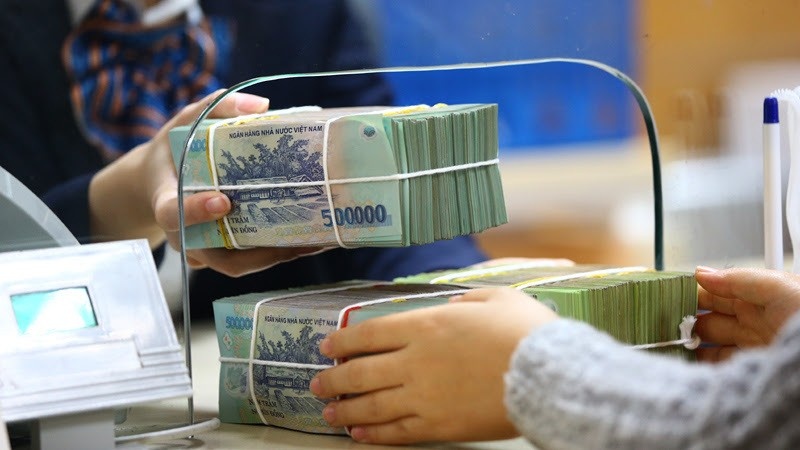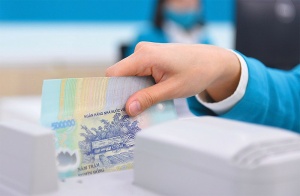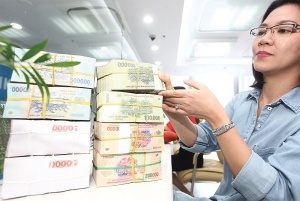INTERNATIONAL INVESTMENT
AND PORTAL
According to Bao Viet Securities Company, deposit rates across several key tenors inched higher in early August, underscoring tightening liquidity. The average six-month deposit rate rose by 0.01 percentage points to 4.48 per cent, while the 12-month rate increased from 5.04 to 5.07 per cent.

State-owned commercial banks have largely maintained their deposit rates across key terms, whereas other commercial banks have recorded slight increases.
Speaking with VIR, a senior executive from state lender BIDV noted that the VND-USD interest rate differential widened again in early August as liquidity conditions became less favourable.
"The pressures, however, may ease in the remaining weeks of the month. Nonetheless, the differential is expected to remain positive, driven by several factors," said the BIDV chief.
In response, the State Bank of Vietnam (SBV) faces limited policy space as it must balance accommodative measures to support the government’s ambitious growth target of 8.3–8.5 per cent with the need to safeguard exchange rate stability amid heightened global uncertainties.
Alongside credit-supportive steps such as raising credit growth limits, directing banks to stabilise deposit rates, and pushing for lower lending rates, the SBV is expected to continue deploying open market operations and flexibly coordinate with the State Treasury deposit channel to secure system liquidity without amplifying exchange rate pressures.
Even so, VND liquidity remains constrained following July’s sharp decline, leaving the market heavily dependent on rollover flows, with an estimated VND180 trillion ($6.92 billion) maturing on the open market this month.
Pressures may ease later in the month, however, as state budget disbursements into the economy are expected to accelerate and inject fresh liquidity.
According to the Ministry of Finance figures, public investment disbursement by the end of July had reached almost 44 per cent of the full-year target assigned by the Prime Minister – around 10 percentage points higher than the same period last year.
Further acceleration is expected to support economic development through the year-end period.
The credit-to-deposit balance across the commercial banking system is forecast to improve slightly in August. However, cumulative capital mobilisation growth still lags credit growth by an estimated 2.5 to 3 percentage points.
While reaffirming its commitment to flexible monetary policy and liquidity support, along with urging credit institutions to implement measures to lower deposit rates and create room for lending rate cuts, SBV Governor Nguyen Thi Hong also highlighted several challenges that are complicating monetary policy management.
"The weakening global growth outlook, persistent risks of resurgent inflation, particularly amid shifting US tariff policies, volatile financial markets, and rising US interest rates, are adding further pressure on domestic policy efforts. These challenges affect market sentiment and carry deep, widespread implications for the foundations of economic development," said Hong.
At a meeting with commercial banks in early August, the SBV revealed that the average lending rate across the system had fallen to 6.53 per cent per annum, down 4 basis points from the end of 2024 – reflecting the central bank’s policy efforts.
However, exchange rate pressure is mounting, driven by both economic fundamentals and market sentiment.
The USD has appreciated by 2.9 per cent against the VND since the end of 2024, prompting the Hong to warn that if pressures continue to intensify, the SBV may reconsider further interest rate cuts to avoid destabilising the exchange rate, which could pose a risk to macroeconomic stability.
In a related development, British lender Standard Chartered's economists have revised down their 2025 inflation forecast for Vietnam to 3.5 per cent, from a previous estimate of 3.8 per cent.
Inflation has stabilised in recent months, with the headline consumer price index remaining below 4 per cent on-year for 11 consecutive months through June.
This trend may limit the scope for further monetary easing and could prompt policymakers to adopt a more neutral policy stance.
Nonetheless, inflation risks persist, particularly on the demand side. Continuing price pressures and the depreciating VND may constrain the ability to reduce interest rates further.
 Credit support offer to help navigate hurdles
Credit support offer to help navigate hurdles
Amid the country’s push to maintain 8 per cent growth, its central bank is compelled to keep interest rates low, while the banking sector rolls out a massive credit package to spur short- and medium-term growth.
 Lenders utilise tiered interest rate incentives
Lenders utilise tiered interest rate incentives
Amid persistently low deposit interest rates, banks are flexibly implementing policies or applying tiered interest rate structures to attract deposit inflows.
 Steady interest rates before H2 rebound
Steady interest rates before H2 rebound
Vietnam’s deposit rates remain subdued on strong liquidity and policy support, but accelerating credit growth and year-end pressures could trigger a mild upward shift.



















